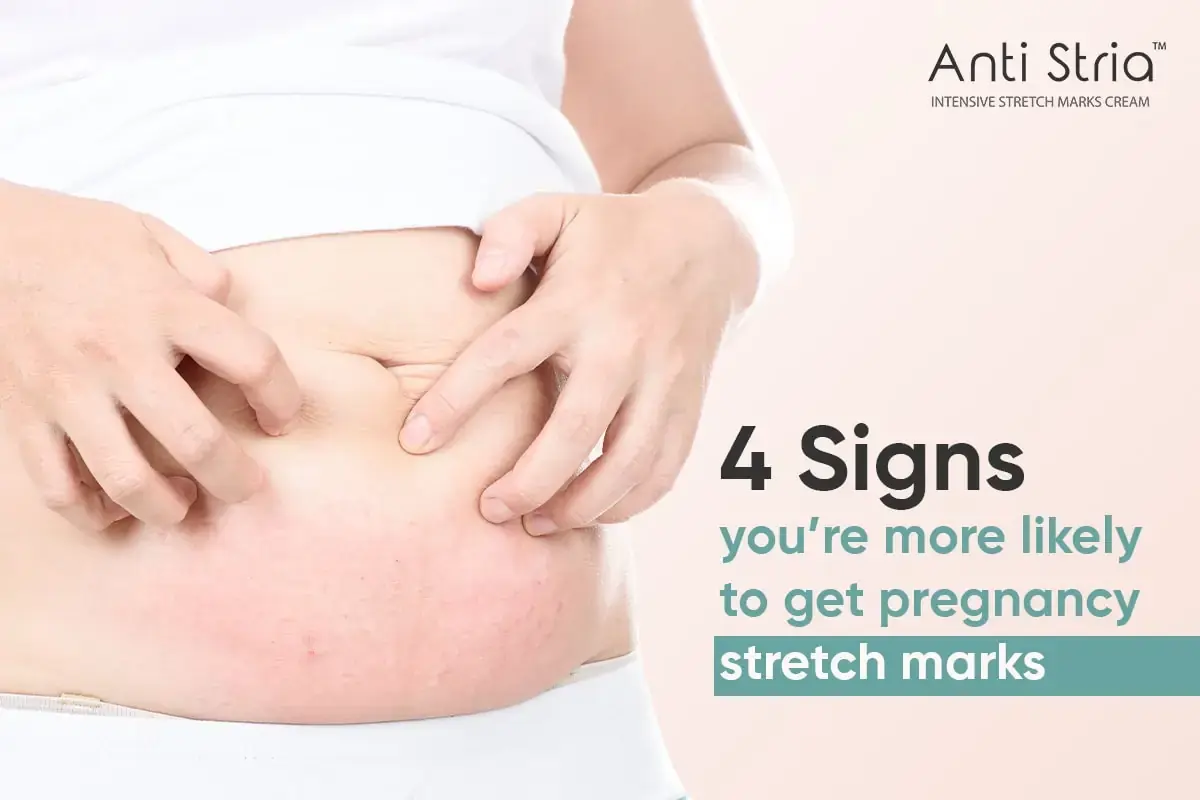Pregnancy often leads to stretch mark scarring, a common skin thinning symptom. The pregnancy stretch marks, which usually appear around week thirty and worsen in the third trimester, can persist even after following preventative measures. Pregnancy marks are more likely to develop due to excessive weight gain during the pregnancy.
Here are four signs that you are maybe more likely to get pregnancy stretch marks and how you can manage them:
Family History: A family history of stretch marks may increase the chances of developing them, but genetic predisposition cannot be prevented. As the stretch marks clearly increase the risk, pregnant women should be able to undertake preventive measures.
Rapid Weight Gain: Healthy BMI before pregnancy will require an average weight gain of 25-35 pounds. Anything above that might make pregnant women more prone to stretch marks on the body. Healthy food consumption in moderation would probably reduce the rate of gaining weight.
Skin Type and Colour: The chances of causing stretch marks is different according to various skin types and colours. People of very white skin are most prone to developing stretch marks because their skin, lacking melanin, a coloured pigment that acts as a shield from UV rays, is less resistant to the effects of such tensions.
Additionally, those with dry skin tend to have less elasticity, making them more susceptible to stretch marks. To help prevent pregnancy-related stretch marks, it’s important to keep the skin hydrated by drinking plenty of water and using moisturizers regularly, which can improve skin elasticity and reduce dryness.
Itching: Itching can also be felt before the marks begin to appear in some pregnant women; hence, using creams to reduce itchiness and possibility of stretch mark development since the creams firm and render skin elastic.
Multiple Pregnancies: Previous pregnancies increase the risk of developing stretch marks due to skin stretching and increased strain.
Women giving multiple births or carrying twins are at a greater risk of developing stretch marks. Some preventive practices, such as massage and moisturizing, together with snug clothes, minimize the visibility of stretch marks after delivery.
Lack of prevention: Prevent stretch marks throughout pregnancy with the help of a stretch mark removal cream, wearing of sunblock, and keeping rehydration abundant. This will strengthen, protect, and elasticize your skin, reducing the risk of tearing and scarring due to elasticity.
MANAGING PREGNANCY STRETCH MARKS:
While stretch marks are a natural part of the journey to motherhood, there are several steps you can take to minimize their appearance and promote healthy skin:
- Stay Hydrated: Maintaining elasticity and minimizing pregnancy stretch marks requires proper skin hydration. Drink much water daily and apply moisturizers or oils specially formulated for pregnancy and give outer nourishment. Moisturize the skin properly to maintain hydration and prevent pregnancy stretch marks. Hydrate internally with the proper amount of water each day. Outer nourishment can be received through the application of moisturizers or oils, which may be specifically formulated for pregnant women.
- Gentle Exfoliation: The process of exfoliation is a routine procedure that improves blood flow that helps in guiding the death of the skin cells, and further enhances the birth of new healthy skin. These gentle processes don’t cause irritation or damage with exfoliates or dry brushing.
- Massage: Moisturizing creams or oils applied might stimulate blood supply and cause more collagen and elastic muscles in the skin that develops stretch marks, mostly around the abdomen, breasts, hips, and thighs.
- Use Stretch Mark Creams: There are many over-the-counter best stretch mark creams for pregnancy formulated for pregnancy. Moisturizing stretch marks cream with lactic acid and collagen can be used, as they will give you moisturized and stronger elasticity skin.
- Protect Your Skin: Don’t expose yourself for too long to the sun; the sun’s radiation damages the skin and makes stretch marks worse. You should wear sunscreen and protective clothes wherever possible outside when the sun is strong.
- Staying Active: Regular, low impact exercising during pregnancy can limit the weight gain to a healthy level, enhance blood circulation, and keep the skin looking healthy. Exercises such as walking, swimming, yoga, and Pilates flex the muscles and help reduce pregnancy marks.
- Eat a Balanced Diet: Rich diet containing vitamins, minerals, and antioxidants, such as fruits and vegetables, lean proteins, and whole grain, can support healthy skin and skin repair.
WHAT MAKES ANTI STRIA THE ‘BEST STRETCH MARK CREAM FOR PREGNANCY’?
ANTI STRIA – this scientifically developed cream for stretch mark nourishes the maternity skin with using only one application per day by combining nature and science.
Anti Stria stretch marks removal cream is a safe and effective stretch marks solution for use during pregnancy, post-delivery, or post-pregnancy, free from Retin-A, parabens, and artificial fragrances.
Anti Stria stretch marks treatment cream contains the star ingredient ‘lactic acid’. Lactic acid is a pivotal ingredient that increases collagen and smoothens out your skin texture, hydrates, reduces hyperpigmentation, and dark spots, and does all this to renew your skin.
ANTI STRIA is gender-neutral stretch marks treatment cream that can use both in pregnancy and post-delivery and for PCOS. This Anti Stria stretch marks cream reduces stretch marks which are caused due to speedy weight gain or loss, cures puberty stretch marks, and removes biceps and thigh stretch marks which occurs during Bodybuilding.
Pregnancy stretch marks are common and natural, influenced by genetics, weight gain, skin type, and previous pregnancies. While preventative measures can minimize their appearance and promote healthy skin, it’s impossible to completely prevent them. Remember that your body’s growth and nurturing are remarkable, and embrace your changes, despite the marks.
Frequently Asked Questions:
Q1. How can stretch marks be minimized when pregnant?
Applying moisturisers and creams that contain cocoa butter, shea butter, or hyaluronic acid may keep skin soft and supple. Other women use oils, like almond or coconut oil, to keep their skin supple.
Q2. Is hydration useful in preventing stretch marks?
Yes. Hydration in general tends to improve skin elasticity. It’s much more difficult to rip apart when it’s elastic, which is why hydration is beneficial during pregnancy. Therefore, hydration is a good predictor of the health of the skin.
Q3. Does dieting affect the risk of developing stretch marks?
Yes. Eating enough vitamins C and E, zinc, and healthy fats tends to be conducive to healthy, elastic skin, thus theoretically lower risks of stretch marks.
Q4. Does fair skin cause stretch marks?
Yes, women with fair skin may have a higher tendency towards stretch marks as such people’s skin contains less melanin, affecting the way skin responds to the level of stretch and UV exposure.
A Certified Nutritionist with a rich healthcare background in health journalism, the author has immense experience in curating reader-friendly, engaging, and informative healthcare blogs to empower readers to make informed pregnancy-related decisions.












